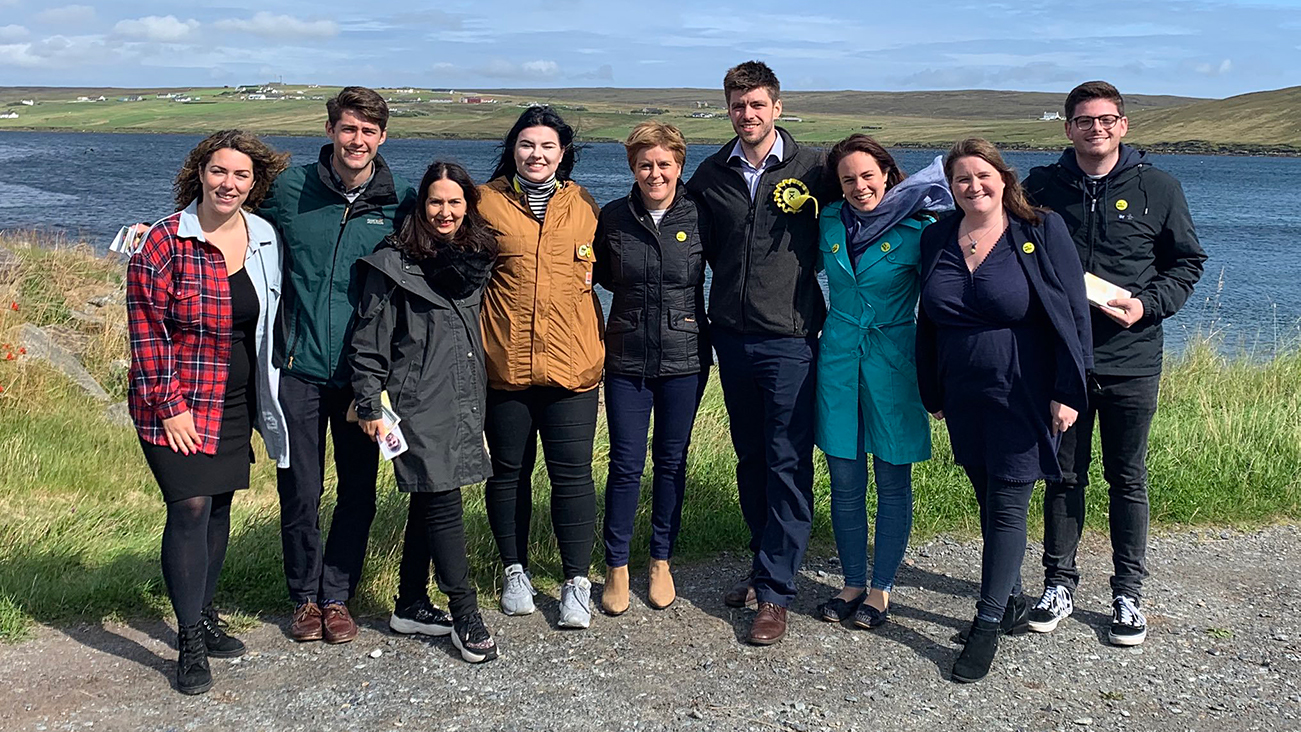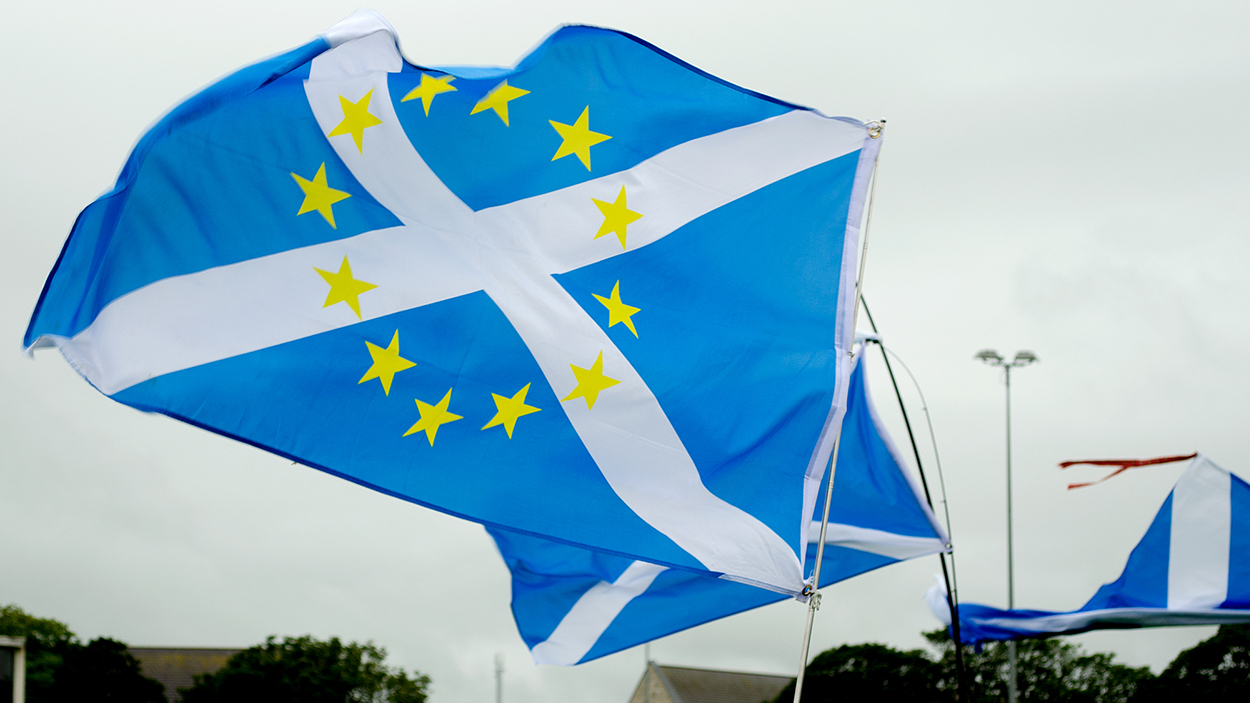52% of Scotland now supports independence, including thousands of Europeans who live here. So why do campaigners feel more could be done to convince Europeans that independence is for them?
Ellen Höfer sits at a packed table in The Clermiston, a cosy pub on the outskirts of Edinburgh. A small crowd has gathered to hear her speak, hoping to hear about the benefits an independent Scotland could bring for EU citizens living here.
Tensions are particularly high as news of Prime Minister Boris Johnson’s plans for a ‘Brexit cabinet’ has just come in. But reassuring the room, Ellen’s voice is soft and calming; a faint German accent slipping through her Glaswegian brogue.
As an organiser with campaign group ‘Europeans for an Independent Scotland’, she regularly holds these meetings across the country.
“I’ve never really stopped having conversations with both Europeans and Scots about independence. I kind of don’t shut up about it,” explains Ellen.
These conversations largely involve explaining the benefits, and technical details, of independence to EU nationals in Scotland.
“We are able to engage with people,” says Ellen, “Not only in the grassroots, but officials and ministers.”
The grassroots side of things functions largely as a means of promoting the benefits of independence to EU citizens. Ellen and her team of volunteers are in daily contact with their 40,000 strong membership, both online and face to face, a group which regularly refers to itself as ‘citizens of naewhere’, a jibe (in the Scots language) at Theresa May’s now infamous speech.
“It’s an advantage of Scotland being a small nation, it’s not that far to shout at somebody’s house until they come out and say ‘right, let’s talk about it,’” says Ellen.

And the group often find themselves shouting at the front door of the Scottish Government in their work standing up for the rights of EU citizens, acting as the mouthpiece between the grassroots movement they have built up and the government in Hollyrood.
In passing on concerns of worried EU citizens, they have teamed up with similar campaign groups in order to approach the Scottish Government with certain demands.
“We formed a group with the 3 Million and other migrant interest groups and started lobbying the Scottish government which was interesting,” says Ellen.
The 3 Million is the most influential organisation of EU citizens in the UK, who work all across the country, campaigning to protect the interests of EU citizens caught up in the uncertainty surrounding Brexit.
“I’ve had the opportunity to discuss with Ben Macpherson and we’re still in contact, and I’m making different suggestions,” says Ellen, “One of those, and it’s one that I’ve been fighting for over a year now, is to make a focus group that’s concerned with immigration.”
Ben Macpherson is the Scottish Government’s Minister for Europe, Migration and International Development. His most recent speech to the Scottish Parliament, made in June, is typical of the positive rhetoric used by the Scottish Government in its discussions of European migration:
‘The Scottish Government is working… to make Scotland as attractive a nation as possible. The biggest barriers to our attractiveness are Brexit and the immigration policies of the UK Government. We all need to work together to oppose those policies, which would have such a negative demographic effect and a negative effect on our economy in the short term.’
It feels nice to be nice to migrants… But there hasn’t been very much action. There are things that could be done.
Ellen Höfer, European Citizens for an Independent Scotland
But Ellen believes this positive rhetoric is not enough, and that Scottish Government should be doing more to protect the rights of EU citizens living in Scotland in the aftermath of Brexit. Hence her push for a focus group, which could facilitate discussions on potential solutions, such as exploring the possibilities of how Scottish law or the Hollyrood’s devolved powers could potentially be used to protect EU citizens.
“We understand that immigration is not devolved to Scotland, but EU citizens and other migrants deserve support,” says Ellen, “The fact that the Scottish Government is not as hostile as the UK government is something that we can only guess at… there hasn’t been any concrete action at this point.”.
However, these doubts are not shared by everyone. Other Scottish Europeans have faith in the Scottish Government and its promise to protect their rights, so convinced that they have actually joined the SNP.
“The Scottish Government has proven that anyone who comes to Scotland is 100% welcome here,” says Julia Stachurska, a student from Wishaw, in her interview with campaign group YYES – Portraits of a Nation. Originally from Poland, Julia moved to Scotland as a child and currently works with SNP Students, travelling across the country to canvas for the party.
Grateful for the opportunity to come to Scotland, she is insistent that others should have the same chance and that it is possible for “young people from across the EU and beyond to make Scotland their home.” And she believes that the social policies of an independent Scotland would be the way to ensure this is possible.

And Julia is not the only European SNP member attracted by the party’s rhetoric.
“I would think that… Scottish Europeans now support independence and the parties who are in favour of independence,” says Jérémie Fernandes, a Frenchman who works with the SNP in Moray.
The SNP secretary, based in Elgin, wants Scotland to continue working within the European Union, and the Scottish Government to continue with its policy of European integration, something which Brexit obviously jeopardises.
But for Ellen Höfer, it is important not to lose sight of the bigger picture and the potential post-independent situation. And so far, she points out, there has been little in the way of action from the SNP in order to ensure there is definitely going to be a space for Europeans in an independent Scotland.
“It feels nice to be nice to migrants but so far the Scottish government has been riding on, basically, kind words to Europeans in our Brexit-related situation, but there hasn’t been very much action,” says Ellen, “There are things that could be done.”
Ellen’s eye is always fixed on what an independent Scotland would look like for EU citizens such as herself, and she is concerned right now that many won’t be able to reap its benefits if the Scottish Government doesn’t take more affirmative action in the face of the UK Government’s ‘hostile environment.’
“If we look at Brexit, the thing that it impacts directly in terms of human rights is the removal of democratic rights for us EU citizens who used to be able to vote in local elections,” says Ellen, “But because the franchise is devolved to Scotland, Scotland is then the one holding the bag as soon as it turns October 31… at that point they are the ones violating human rights.”
However, for all the work that still needs to be done, Ellen is quick to emphasise that the ‘kind words’ the Scottish Government have sent out over the last few years have been more than just hot air, and they have made a difference in terms of influencing people’s attitudes towards immigration.
“I think the Scottish Government’s positive noise making about Europeans must have had a firm hand over the control of public opinion,” says Ellen.
She believes that the SNP’s support of migrants, at least in words, has led the independence movement to generally be a welcoming place for EU citizens. Looking at Europeans such as Julia or Jérémie, working within Scottish politics to push for independence, the acceptance of migrants in the mainstream of Scottish nationalism is on clear display, even if campaigners like Ellen believe that the government itself could do more to support them.
There is also another major issue that EUCIS must iron out through grassroots efforts – the fact that some Europeans still feel that independence is not their place. Ellen even admits to catching herself being doubtful on occasions.
“The longer I do it and catch myself thinking about it, I go, ‘right, stop being silly’. But it’s something that you have to consciously overcome. I’m not just a guest here, I’m kind of responsible.”
However, that responsibility has been forced upon Europeans in Scotland, who Brexit has left in a much more precarious position than they were in the 2014 referendum.
“I think Brexit doesn’t afford that peace any more, for both EU citizens and citizens of the UK,” says Ellen, speaking about the desire to stay out of the debate surrounding independence.
So EUCIS is determined to get EU citizens to be more comfortable participating in Scottish politics, potentially providing the Yes camp with thousands of new votes, through engaging as many European Scots as possible.
“We ended up printing about three quarters of a million leaflets that informed people about registering to vote. Half of them were in Polish and the other half in English,” says Ellen,
“Migrants have an additional barrier… they don’t have those established networks, so it’s quite easy to live your life without being politically engaged.”
And for migrants, the challenge of breaking into those networks is not helped by the perceived sense of standoffishness they get from Scots towards discussing politics out in the open.
“I find there is little appetite to discuss politics in public in Scotland,” says John Förster, a German who campaigns for independence on Twitter with his account ‘Scotland IN Europe’.
“People can appear quite embarrassed at times having to talk about it,” he explains.
This is where EUCIS want to step in.
“If you’re going to reach somebody, you might not reach them in the places Scots would go, but you will definitely reach them online, “ says Ellen, “Via a friend commenting on a post, being friendly, inclusive and welcoming to foreigners. That’s how you target that audience.”
And seeing the faces of fellow migrants such as Ellen will undoubtedly have an impact on individuals still unsure whether to engage with the independence debate. In the EU’s own guidance on how to get immigrant groups more involved in politics, they recommend that ‘target groups themselves are involved’ in the process of encouraging political participation.
Back in The Clermiston, sat discussing independence over pints of Tennents, that is exactly what Ellen is doing with this particular crowd of EU citizens.
Looking to the future, and an independent Scotland, EUCIS are cautiously optimistic, but Ellen is more than aware that attitudes towards immigrants can flip at any point.
“I’m sure the migration thing quite often is… self-congratulatory. It’s easy to be welcoming,” says Ellen, commenting on the Scottish Government’s positive rhetoric. Instead, she advocates for EU citizens to be their own champions in an independent Scotland.
“What it takes is people who are willing to step into that spotlight. It’s not that easy. It’s a struggle, especially with Brexit,” says Ellen, “What is required is telling your own story, over and over.”
But fortunately for Europeans across Scotland, there are individuals like Ellen willing to step into that spotlight.

